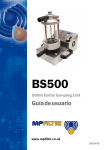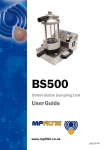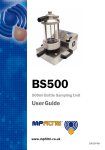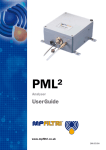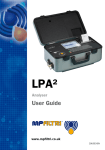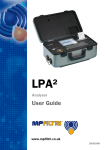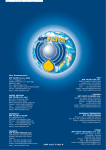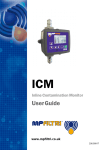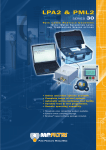Download BS110/User Guide
Transcript
BS110 110ml Bottle Sampling Unit User Guide www.mpfiltri.co.uk 200.050-EN Covers Model Numbers BS110 SAFETY WARNING Hydraulic systems contain dangerous fluids at high pressures and temperatures. Installation, servicing and adjustment is only to be performed by qualified personnel. Do not tamper with this device. Document Revision 6.1 Contents 1 Precautions 5 •Internal Cleaning 2 Scope of Supply 6 3 Introduction 7 4 Procedure 8 •De-aeration •Operating with Particle Analyser 5 Sample Bottle Cleaning Procedure 11 6 Information 12 •Warranty •Spare Product / Part Numbers 7 Fault Finding •Flushing Fluids 13 Document Revision 6.1 1 Precautions 1.1 Internal Cleaning DO NOT clean the Bottle Sampler with Acetone or similar solvents that are not compatible with the seals. The recommended cleaning fluid for internal flushing is listed on the website: www.mpfiltri.co.uk Precautions 5 2 Scope of Supply Each standard Bottle Sampler supplied consists of the following:• • • • • • • • • • • • 1 x BS110 particle counter accessories bag, containing:1 x 110ml Bottle Sampler 1 x Pressure cap 1 x Vacuum cap 1 x Test hose x 0.6m long 1 x Waste bottle 1 x 12V DC power supply (for a combined code when ordering, an extra power supply is included in case) with UK, EU and US heads. 1 x Hand pump and 10m hose 1 x BS110 User guide 2 x Paper roll 3 x 100ml bottles 1 x Pack of disposable dip tubes Figure 1 6 Scope of Supply 3 Introduction The Bottle Sampler is an aid to accurate contamination monitoring suitable for laboratory applications utilising mineral oil as the operating fluid, (other options may be available, please contact your local sales office). The Bottle Sampling Unit has the optional facility to de-aerate the fluid sample, prior to testing with the analyser, by applying a vacuum to the chamber holding the sample bottle. Two different types of cap are supplied with the Bottle Sampler: • • Vacuum cap - a blank cap, used when de-aerating the fluid. Pressure cap - used when delivering a fluid sample to the analyser. This cap incorporates an anti-vacuum valve. The Bottle Sampler is designed to accept 100ml and 110ml bottles. Due to the limited fluid volume available and the requirement of a 3 minute flush period prior to a sample test, the moisture sensor test should not be performed utilising the bottle sampling method. Introduction 7 4 Procedure Refer to key drawing on page 6. 1. Draw off a sample of oil (80 ml. minimum) from the system into the bottle provided. If this is impractical then use the hand pump, clean bottle and hose provided to draw off a sample of fluid. Note: Please ensure that the pump and hose are cleaned with an appropriate filtered solvent (i.e. petroleum ether) prior to the sample being taken. Sample bottles and associated products are to be cleaned in accordance with the instructions on page 11. Important! Do NOT use acetone. 2. Insert waste fluid hose into the waste bottle provided. 3. Connect waste fluid hose to analyser (waste connector). 4. Connect the 12V DC supply to bottle sampler, using power adaptor supplied. 4.1 De-aeration For full compliance please refer to standard BS11500:2008 5. Agitate sample for minimum 60 seconds. 6. Place the sample bottle into the bottle sampler. 8 Procedure 7. Fit the vacuum cap to the bottle sampler. 8. Turn knob to select vacuum (note: the intermediate position between vacuum and sample performs no function) 9. Switch ON the bottle sampling unit and leave running for several minutes, until all air bubbles have been removed from the fluid sample. 10. Switch OFF the bottle sampler - this automatically vents the chamber to atmosphere. Always switch off the bottle sampling unit before turning the vacuum/ sampling knob. 4.2 Operating with Particle Analyser 11. Fit a new disposable tube into the pressure cap, and fit the cap to the bottle sampler. 12. Connect test hose (0.6m) to bottle sampling connection. 13. Connect test hose to particle analyser. 14. Switch ON the particle analyser. 15. Select Triple or Bottle Sampling option. 16. Enter test details, for more information refer to the particle analyser user guide. 17. Rotate selector knob to Sample position. 18. Switch ON the bottle sampler. Procedure 9 19. Flush the analyser for a minimum of 10 seconds. 20. Start the test. The Bottle Sampling Test is a three test analysis, as described in the analyser user guide. 21. Upon test completion, after the emptying cycle is completed, switch OFF the bottle sampler - this automatically vents the pressurised chamber to atmosphere. 22. Switch OFF the particle analyser. 10 Procedure 5 Sample Bottle Cleaning Procedure For optimum results the bottle sampling procedure should only be taken when the procedure for qualifying and controlling methods for sampling containers and products conform to ISO 3372. However, the following routine may be utilised, if the above routine cannot be completed: • • • • Half fill the sampling bottle with the fluid to be analysed. Re-cap the bottle and shake vigorously for 30 seconds. Dispose of the fluid (in accordance with current COSHH legislation). Repeat the above procedure another two times. When bottle is filled, fourth time, this is the sample that will be analysed. Sample Bottle Cleaning Procedure 11 6 Information 6.1 Warranty The BS110 is guaranteed for 12 months upon receipt of the Bottle Sampler, subject to it being used for the purpose intended and operated in accordance with this User Guide. 6.2 Spare Product / Part Numbers Please see website for details: www.mpfiltri.co.uk 6.3 Flushing Fluids DO NOT USE ACETONE For information about the items on this page please see the website: www.mpfiltri.co.uk 12 Information 7 Fault Finding FAULT CHECK Unexpected results obtained from sample Check that the test hose has been fully connected at both the bottle sampler and the particle analyser ends. Confirm that there is a free flow of fluid to the particle analyser, by operating the flush valve and observing fluid passing to waste. Bottle sampler not reaching required pressure. Fault Finding Re-oil o-ring in top of bottle sampler chamber. Check valve in pressure cap is still able to move around, if not flush with air or Isopropyl Alcohol. 13 14 Fault Finding Produced by MP Filtri UK Revision 6.1 As a policy of continual improvement, MP Filtri UK reserve the right to alter specifications without prior notice. Except as permitted by such licence, no part of this publication may be reproduced, stored in retrieval system or transmitted, in any form or any means, electronic, mechanical, recording, or otherwise, without prior written permission of MP Filtri UK.
















